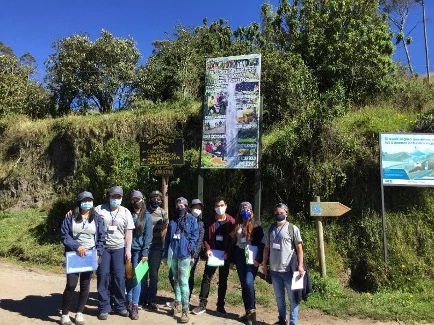News
New open mapping actors in Ecuador
The collaboration of experienced free culture activists with new mappers is renewing the landscape of collaborative cartography in Ecuador.
Nuevos actores del mapeo abierto en Ecuador
La colaboración de experimentados activistas de la cultura libre con nuevos mapeadores esta renovando el panorama de la cartografía colaborativa en Ecuador.
Open Mapping News from LATAM
2022 seems like a good year for the Latin American OSM community, let's see what new activities are being developed in the countries of the region.
Mapeando o Cuidado
A URBELatam, uma parceria de três universidades, está trabalhando com o Banco Preventório para mapear a comunidade do Morro do Preventório próximo ao Rio de Janeiro. O mapa permitirá que o banco amplie seus serviços à comunidade e sirva de modelo e inspiração para outras favelas.
Mapping the Care of People with URBELatam
URBELatam, a partnership of three universities, is working with the Preventório Community Bank to map the Morro do Preventório community near Rio de Janeiro. This will enable the bank to expand its services to the community and serve as a model and inspiration for other favela communities.
How does pollution stall productivity? Studying Monrovia's Duala Market
The World Bank, the Humanitarian OpenStreetMap Team, and iLab Liberia partnered to assess how pollution and lack of infrastructure was impeding the productivity of the Duala Market, Monrovia's largest wholesale market.
Open Mapping Hub in LATAM - December 2021 update
We are excited to share with you an update on how at HOT we plan to increase our support to Open Mapping on the LATAM region to find ways to connect geospatial data and community effort towards collective well-being!
Reaching Inaccessible Communities Through Road Mapping for Sustainable Development
Since 2017, HOT has partnered with Facebook to build up and improve the data in OSM, particularly for countries in Southeast Asia where HOT has extensive experience in generating open geodata for humanitarian actions.
HOT-MERL is Monitoring OSM and Tasking Manager Projects Across our Priority Countries
HeiGIT and HOT have partnered to extend the Humanitarian OSM Stats website to help relay mapping statistics to the public. It includes data, not only from HOT Tasking Manager projects, but also from all the other OSM contributors.
The Language Localization Project: Enabling Inclusion and Participation
Together with the local communities and contributors from Vietnam, Madagascar, and Mozambique, as well as the Open Mapping Hubs in the Asia-Pacific and East & Southern Africa, the Localization Project aims to develop baseline data to inform a self-sustainable Localization Strategy. We aim to bridge the gap between language and accessibility of Humanitarian Open Mapping resources.
Launching: She Leads and She Inspires - Women in Leadership Program
“I raise up my voice - not so I can shout but so that those without a voice can be heard…we cannot succeed when...
Announcing Booster Grants for Communities and Organizations in the Asia-Pacific
The Open Mapping Hub - Asia Pacific is excited to announce the “Booster Grants” to meet the hub's vision to “create a sustainable OSM ecosystem in the Asia-Pacific region.”
OSM Kerala - The past, present, and future.
An overview of OSM Kerala's inspiring journey and continued efforts to strengthen the use of OSM in Kerala for disaster response and community development.
Fostering the Use of Open Mapping Technologies in Government Departments — Mwanza, Tanzania (by OMDTZ)
After five months of data collection in Mwanza, on 12th to 15th April 2021, the Ramani Huria consortium facilitated a final workshop with key government officials to share the methodology, collected data, and discussions on how they can use the data for disaster management and risk reduction in Ilemela and Nyamagana.
Monitoring OSM and Tasking Manager to Map an Area Home to 1 Billion
HOT and HeiGIT are collaborating to enhance HOT’s monitoring, evaluation, reporting, and learning systems to track progress and accelerate growth towards the goal of mapping an area home to one billion people.











+(6)+(1).png)



